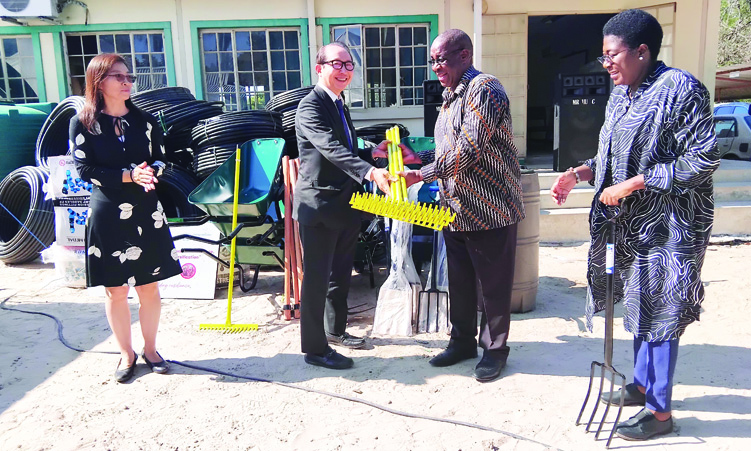Zambezi regional governor Lawrence Sampofu has appealed to potential investors to reach out to his office to acquire land for green scheme project developments in the region.
He made this call on Saturday during the official handover of gardening tools and small-scale irrigation systems to the Zambezi Regional Council by the Food and Agriculture Organisation of the United Nations (FAO), in partnership with the Ministry of Agriculture, Water and Land Reform (MAWLR) at Katima Mulilo.
Over 1 525 farmers in the Zambezi region will be beneficiaries of an emergency response to mitigate multiple shocks and enhance resilience livelihoods in Namibia that are funded by the government of Japan.
According to Sampofu, in hopes of helping the government realise its dream of making the Zambezi region a food basket of the country, the four traditional authorities have made a combined total of over 30 000 hectares of land available for green scheme purposes.
“We have fertile land and an abundance of water. If you yourself are interested or have friends that are investors, be they local or international, please bring them to our offices because we have enough land – over 30 000 hectares of land to be exact,” he said.
Sampofu then appealed to the beneficiaries who will be receiving the donated tools to use them together with their skills to produce food to ensure the country’s food security.
“In 2019, when the Agro Marketing and Trade Agency (Amta) banned the import of vegetables from Zambia, six community members came to my office wanting to demonstrate against Amta’s decision. However, I asked them if they were serious because I saw it as an opportunity that Amta created for them to produce vegetables and fill the markets with locally produced products. Since then, I have been encouraging farmers to go find land and start producing their own vegetables,” he said.
Japanese ambassador to Namibia Hisao Nishimaki, who also spoke at the same event, noted that through this funding, they hope to strengthen national and local capacity to mitigate the multiple shocks and ensure resilience, as well as diversified threats to livelihoods.
He added that the project, which is focused on the Zambezi, Kavango West, Ohangwena and //Kharas regions, aims to improve nutritious diets for vulnerable communities.
“This intervention will target 6 100 farming households from the focal regions, as well as 110 agricultural extension staff, vulnerability assessment committee members and selected key community role players from across all 14 regions,” he said.
He then revealed that the Japanese government, through FAO, has donated N$25,3 million to support various project activities.
As far as the status of green schemes funded by the government is concerned, the Mafwe Traditional Authority has allocated about 1 600 hectares of land to the government for the implementation of the Katima-Liselo farm project.
However, until today, there have been no agricultural activities taking place, despite the government spending taxpayers’ money to fence and de-bush the farm.
During 2021, the MAWLR started exploring the option of getting private partners to implement the rest of the project.
Furthermore, with regard to the Kalimbeza rice project, the government has provided about N$8 million to recoup operations that have been on the brink of collapse.
Stay informed with The Namibian – your source for credible journalism. Get in-depth reporting and opinions for
only N$85 a month. Invest in journalism, invest in democracy –
Subscribe Now!







